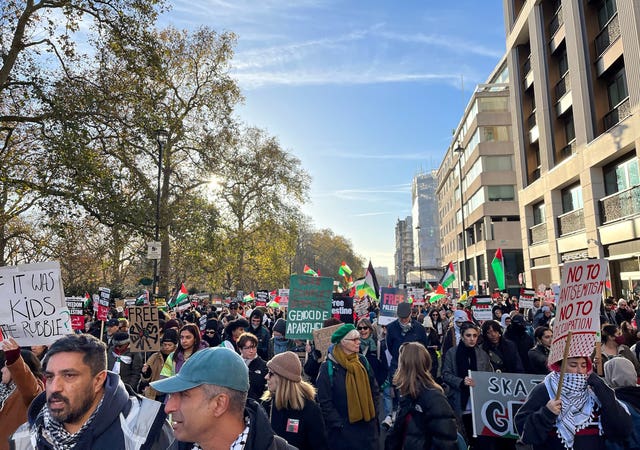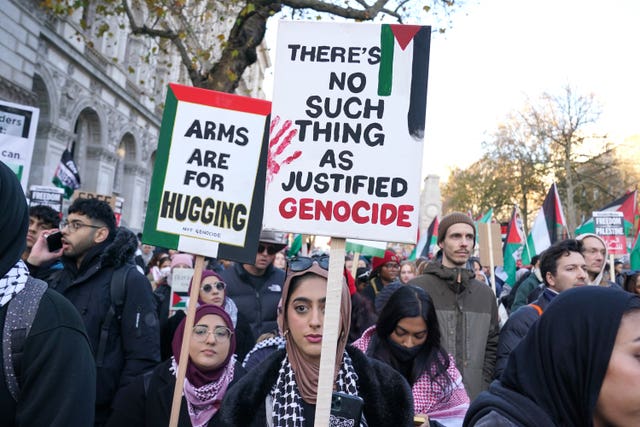
Tens of thousands of people have taken to the streets of London to call for a permanent ceasefire in Gaza.
The latest major demonstration in the capital came as Hamas said it was delaying the release of a second group of hostages, claiming that Israel had not complied with the deal’s terms and not delivered enough aid to Gaza.
The militant group had been preparing to release more than a dozen hostages on Saturday for several dozen Palestinian prisoners held by Israel, on the second day of a temporary truce.
It follows weeks of fighting and Israeli bombardments of Gaza during the conflict sparked by the Hamas incursion into southern Israel that saw 1,200 people killed.
Protesters in London marched from Park Lane to Whitehall, with the Metropolitan Police also handing out leaflets to provide “absolute clarity” on what will be deemed an offence.
It comes after weeks of pressure on the force over the handling of the now-regular demonstrations, with pressure from senior politicians for officers to come down harder on alleged displays of antisemitism.
As the demonstration began, the Met said one protester had been arrested on suspicion of inciting racial hatred.
Officers are at the forming up point of today’s protest.
They have been handing out leaflets to provide clarity on offences and behaviour that won’t be tolerated. pic.twitter.com/NcyhTakPCy
— Metropolitan Police (@metpoliceuk) November 25, 2023
A series of handmade placards and banners were held up by pro-Palestinian demonstrators, with some referencing the slogan “from the river to the sea”.
One placard displayed a picture of Labour leader Sir Keir Starmer under the word “Genocide”, while another had a picture of leaders of the G7 above the phrase “War criminals on the run”.
Ahead of the march Metropolitan Police Deputy Assistant Commissioner Ade Adelekan said the leaflets set out “that anyone who is racist or incites hatred against any group should expect to be arrested. As should anyone who supports Hamas or any other banned organisation”.

“We will not tolerate anyone who celebrates or promotes acts of terrorism – such as the killing or kidnap of innocent people – or who spreads hate speech,” he said.
Organisers Stop the War Coalition said that such a measure was “intrusive”, but asked anyone attending to avoid “any actions that might leave you or others around you open to arrest”.
“We ask that all attending our marches respect these clear anti-racist principles, including in any signs or placards they choose to bring to the march,” the group said in a statement.
Hundreds also gathered outside the Egyptian Embassy in Mayfair for a demonstration by Hizb-ut-Tahrir, in the first protest by the group since October 21 after a video emerged showing a man chanting “jihad”.
The Met said no offences were identified from the clip, but it prompted an outcry from politicians.
At the start of the rally on Saturday, the crowd was warned by an organiser: “Don’t come up with your own chants, follow what is on the stage, follow the chants from those who are chanting.”
Around 20 police officers were present at the peaceful demonstration which lasted approximately 90 minutes.

A statement by the group said Muslim leaders “should not feel bound” by Western laws and borders, calling the latter “mere lines in the sand”.
Dr Abdul Wahid, of the UK executive committee of Hizb-ut-Tahrir, told the crowd liberation would mean a “system that allowed Muslim, Jew and Christian to live side by side in peace and respect with everyone having rights”.
The crowd, made up of men, women and children, held signs that read “Muslim Armies! Liberate Palestine!” and “US & UK Hands Off The Middle East”.
The Met said that a “breakaway group” from the main protest had marched up Whitehall after the demonstration had ended, with some setting off flares.
A 90-minute march organised by the charity Campaign Against Antisemitism is also due to take place on Sunday, with around 40,000-50,000 people expected to attend.
On the first day of the four-day ceasefire, Hamas released 24 of the about 240 hostages taken during its October 7 attack on Israel that triggered the war, and Israel freed 39 Palestinians from prison.
Those freed from captivity in Gaza were 13 Israelis, 10 Thai nationals and a citizen of the Philippines.
Under the agreement, Hamas will release one Israeli hostage for every three prisoners freed.


Why are you making commenting on The Herald only available to subscribers?
It should have been a safe space for informed debate, somewhere for readers to discuss issues around the biggest stories of the day, but all too often the below the line comments on most websites have become bogged down by off-topic discussions and abuse.
heraldscotland.com is tackling this problem by allowing only subscribers to comment.
We are doing this to improve the experience for our loyal readers and we believe it will reduce the ability of trolls and troublemakers, who occasionally find their way onto our site, to abuse our journalists and readers. We also hope it will help the comments section fulfil its promise as a part of Scotland's conversation with itself.
We are lucky at The Herald. We are read by an informed, educated readership who can add their knowledge and insights to our stories.
That is invaluable.
We are making the subscriber-only change to support our valued readers, who tell us they don't want the site cluttered up with irrelevant comments, untruths and abuse.
In the past, the journalist’s job was to collect and distribute information to the audience. Technology means that readers can shape a discussion. We look forward to hearing from you on heraldscotland.com
Comments & Moderation
Readers’ comments: You are personally liable for the content of any comments you upload to this website, so please act responsibly. We do not pre-moderate or monitor readers’ comments appearing on our websites, but we do post-moderate in response to complaints we receive or otherwise when a potential problem comes to our attention. You can make a complaint by using the ‘report this post’ link . We may then apply our discretion under the user terms to amend or delete comments.
Post moderation is undertaken full-time 9am-6pm on weekdays, and on a part-time basis outwith those hours.
Read the rules hereComments are closed on this article